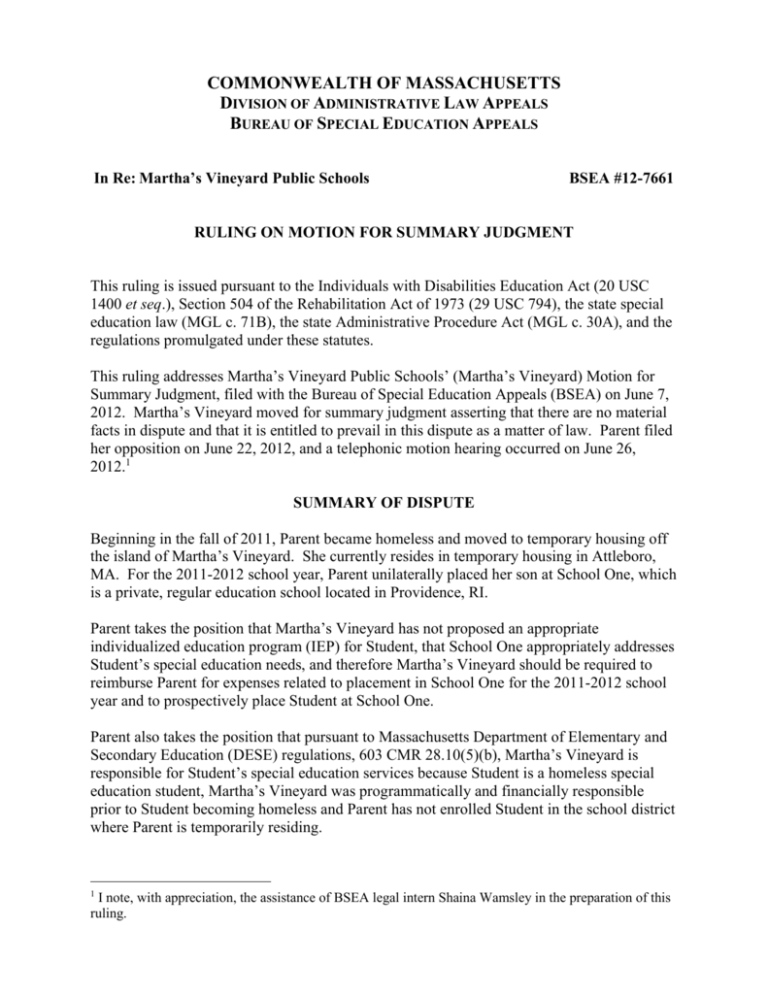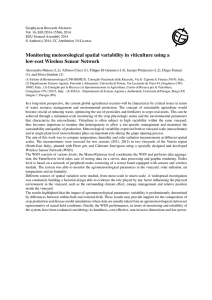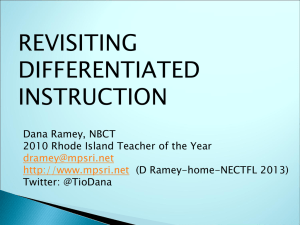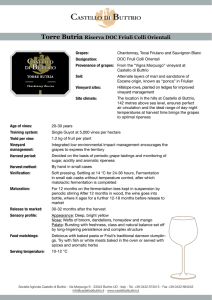In Re: Martha`s Vineyard Public Schools BSEA #12-7661
advertisement

COMMONWEALTH OF MASSACHUSETTS DIVISION OF ADMINISTRATIVE LAW APPEALS BUREAU OF SPECIAL EDUCATION APPEALS In Re: Martha’s Vineyard Public Schools BSEA #12-7661 RULING ON MOTION FOR SUMMARY JUDGMENT This ruling is issued pursuant to the Individuals with Disabilities Education Act (20 USC 1400 et seq.), Section 504 of the Rehabilitation Act of 1973 (29 USC 794), the state special education law (MGL c. 71B), the state Administrative Procedure Act (MGL c. 30A), and the regulations promulgated under these statutes. This ruling addresses Martha’s Vineyard Public Schools’ (Martha’s Vineyard) Motion for Summary Judgment, filed with the Bureau of Special Education Appeals (BSEA) on June 7, 2012. Martha’s Vineyard moved for summary judgment asserting that there are no material facts in dispute and that it is entitled to prevail in this dispute as a matter of law. Parent filed her opposition on June 22, 2012, and a telephonic motion hearing occurred on June 26, 2012.1 SUMMARY OF DISPUTE Beginning in the fall of 2011, Parent became homeless and moved to temporary housing off the island of Martha’s Vineyard. She currently resides in temporary housing in Attleboro, MA. For the 2011-2012 school year, Parent unilaterally placed her son at School One, which is a private, regular education school located in Providence, RI. Parent takes the position that Martha’s Vineyard has not proposed an appropriate individualized education program (IEP) for Student, that School One appropriately addresses Student’s special education needs, and therefore Martha’s Vineyard should be required to reimburse Parent for expenses related to placement in School One for the 2011-2012 school year and to prospectively place Student at School One. Parent also takes the position that pursuant to Massachusetts Department of Elementary and Secondary Education (DESE) regulations, 603 CMR 28.10(5)(b), Martha’s Vineyard is responsible for Student’s special education services because Student is a homeless special education student, Martha’s Vineyard was programmatically and financially responsible prior to Student becoming homeless and Parent has not enrolled Student in the school district where Parent is temporarily residing. 1 I note, with appreciation, the assistance of BSEA legal intern Shaina Wamsley in the preparation of this ruling. Martha’s Vineyard disenrolled Student when he stopped attending school in the Martha’s Vineyard School District in the fall of 2011. Martha’s Vineyard takes the position that under the McKinney-Vento Homeless Assistance Act (McKinney-Vento), 42 USC § 11431 et seq., it was entitled to disenroll Student and that the BSEA does not have jurisdiction to review this determination. Alternatively, Martha’s Vineyard takes the position that if the BSEA were to take jurisdiction, it should determine that Martha’s Vineyard has no responsibility for Student’s education. SUMMARY JUDGMENT STANDARD The Executive Office of Administration and Finance Adjudicatory Rules of Practice and Procedure, which are applicable to BSEA hearings, allow for summary decision when there is no genuine issue of fact relating to all or part of a claim or defense, and the moving party is entitled to prevail as a matter of law.2 Further guidance is found by turning to judicial rules regarding a motion for summary judgment, which set forth a standard substantially similar to the above-referenced adjudicatory rules. Federal Rule of Civil Procedure 56(c) provides that summary judgment is appropriate when “the pleadings, depositions, answers to interrogatories, and admissions on file, together with the affidavits, if any, show that there is no genuine issue as to a material fact and that the moving party is entitled to a judgment as a matter of law.” A “genuine” issue is one that could be resolved in favor of either party, and a “material fact” is one that has the potential of affecting the outcome of the case.3 FACTS Unless otherwise noted, the following facts are not in dispute. During the 2010-2011 school year, Student attended the Oak Bluffs Elementary School as an 8th grader. Oak Bluffs School is within the Martha’s Vineyard School District. During this school year, Student was evaluated and found eligible to receive special education services. Martha’s Vineyard proposed an IEP to address Student’s special education needs. The IEP Team proposed an IEP for the period 1/26/11 to 6/20/11. The IEP described Student as “on an emergent level emotionally and socially as he’s lacking the ageappropriate adaptive skills;” he “misses social nuances, and incidental nonverbal cues;” and “his affect is very flat and nonreactive.” The IEP referenced a diagnosis of Asperger’s Syndrome. The IEP proposed the following direct services within the general education classroom to be provided by special education or regular education staff: executive functioning services for a half hour each day and academic supports for 15 minutes each day. The IEP also proposed the following direct services in other settings to be provided by special education staff: 2 3 801 CMR 1.01(7)(h). These rules govern BSEA proceedings pursuant to 603 CMR 28.08(5)(b). Anderson v. Liberty Lobby, Inc., 477 U.S. 242, 248-50 (1986). 2 organizational skills services for a half hour each week and communication services for a half hour each week. Parent takes the position that she accepted the offered IEP for the 2010-2011 school year, but she has not asserted that her acceptance was in writing. Martha’s Vineyard has no record of written consent, and takes the position that no written consent of the IEP was ever provided. Student received some or all of the services described in the IEP. Martha’s Vineyard takes the position that these services were provided as regular education support, rather than special education services, because there was no accepted IEP. An IEP Team convened on June 15, 2011 to discuss an IEP for the 2011-2012 school year. The Team proposed an IEP that placed Student at the Martha’s Vineyard High School. The only proposed services were academic supports by a special education teacher outside of the general education classroom for 84 minutes, five times per ten-day cycle. Parent and the Martha’s Vineyard Special Education Director met in August 2011. During this meeting, Parent orally rejected the IEP (and placement) in full and requested that Martha’s Vineyard pay for Student to attend a private school (School One) in Providence, RI. (As with the previous IEP, it appears that Parent never made a written rejection or acceptance of the IEP and placement.) The Special Education Director declined to fund School One. In September 2011, Student began attending School One. When Student did not attend the Martha’s Vineyard High School for 15 consecutive days during the fall of 2011, he was disenrolled by Martha’s Vineyard through an October 5, 2012 letter from the High School Principal to Parent. During the fall of 2011, Parent lost her housing on Martha’s Vineyard. She moved from the Island sometime between October 2011 and December 2011. Between December 2011 and April 2012, Parent moved four times and currently resides in temporary housing in Attleboro, MA. Student has lived with his brother in Providence, RI during the school week while attending School One during the 2010-2011 school year, and otherwise has lived with Parent. On April 26, 2012, Parent, through her attorney (Raymond Yox), filed a hearing request with the BSEA seeking reimbursement and prospective placement at School One. On May 15, 2012, Martha’s Vineyard, through its attorney (Mary Joann Reedy), filed its response to the hearing request. By letter of May 21, 2012 to Peter Cironi at DESE’s Office for the Education of Homeless Students, Martha’s Vineyard’s attorney took the position that Student had been dropped from the Martha’s Vineyard’s school rolls due to non-attendance, and that because Student had moved so far from the Island, it was “entirely impractical” and not in Student’s “best interests” for him to be enrolled in Martha’s Vineyard Public Schools. The letter then stated: “I submit that in these circumstances, the Office for Education of Homeless Students must determine whether [Student] has a right to continued enrollment in the Martha’s Vineyard Schools prior to consideration of any claims by the BSEA.” 3 DISCUSSION A preliminary question raised by Martha’s Vineyard is whether Student is (and has been) a regular education student or special education student during the time period in question. Although Parent takes the position that she accepted the initial IEP, with the result that Student received certain special education services delineated within his IEP, Parent has not asserted that she has ever signed an IEP. Martha’s Vineyard takes the position, supported by the affidavit of its Special Education Director, that Parent has never provided written acceptance of an IEP in whole or in part, and therefore argues that Martha’s Vineyard only provided support services to Student as a regular education student and never provided Student with special education services. For purposes of the instant ruling, I will assume that Martha’s Vineyard is correct that Parent never signed an IEP and Student has never received special education services. On this basis, I will determine whether Student was (and is) a regular education or special education student. In support of its position, Martha’s Vineyard points to DESE regulation 603 CMR 28.07(1)(a), which requires that a school district obtain “written parental consent before … making an initial placement of a student in a special education program.” Similarly, the federal special education statute (Individuals with Disabilities Education Act or IDEA) provides in relevant part: Effect on agency obligations. If the parent of such child refuses to consent to the receipt of special education and related services, or the parent fails to respond to a request to provide such consent-(aa) the local educational agency shall not be considered to be in violation of the requirement to make available a free appropriate public education to the child for the failure to provide such child with the special education and related services for which the local educational agency requests such consent; and (bb) the local educational agency shall not be required to convene an IEP meeting or develop an IEP under this section for the child for the special education and related services for which the local educational agency requests such consent.4 The IDEA regulations define “consent” as agreeing “in writing to the carrying out of the activity for which his or her consent is sought”.5 4 20 USC § 1414(a)(1)(D)(ii)(III). See Colbert County Bd. Of Ed. V. B.R.T., CV-07-T-1430-NW, 51 IDELR 16, 108 LRP 54023 (N. Dist. of Ala. 2008) (“If the parent refuses to provide consent for the initial provision of services, or the parent fails to respond to a request to provide such consent, the school board ‘shall not be considered in violation of the requirement to make available a free appropriate public education to the child’” quoting 20 U.S.C. § 1414(a)(1)(D)(ii)(III)(aa)). The regulations under the IDEA include similar language. See 34 CFR § 300.300(b). 5 34 CFR §300.9. 4 I understand the above-referenced statutory and regulatory language to protect Martha’s Vineyard from a FAPE claim based upon an argument that it did not provide the special education and related services described within the proposed IEPs. This is because Parent did not provide written consent to any services or placement. But, this language only protects Martha’s Vineyard from a claim regarding failure to provide “the special education and related services for which [Martha’s Vineyard] requests such consent” and does not protect Martha’s Vineyard from liability for proposing an inappropriate IEP.6 And, Parent’s claim goes only to the question of whether Martha’s Vineyard has proposed IEPs that are reasonably calculated to provide Student with FAPE—that is, whether the IEPs were appropriate. There remains the broader question of whether Student may be considered a special education student without Parent’s providing written consent, in whole or in part, to an IEP. Martha’s Vineyard takes the position that Student must be considered a regular education student because Parent has never provided written consent. Although, as discussed above, it is clear that Student has no right to receive any of Martha’s Vineyard’s proposed services and placement absent written consent, I can find nothing within statute, regulation or guidance that requires consent prior to Student having the status (and legal protections) of a special education student once Martha’s Vineyard IEP Team determined that Student was eligible to receive special education services. In contrast, IDEA regulations provide that if (after initial provision of special education and related services) a parent “revokes consent in writing for the continued provision of special education services,” the parent’s action precludes the school district from continuing to provide special education services and related services, and eliminates any potential liability for the school district’s failure to provide special education and related services.7 Student’s continuing special education eligibility is illustrated by what occurred in anticipation of Student’s 9th grade year. Parent did not want to accept any of the proposed special education services or the special education placement on the IEP, but she nevertheless sought Martha’s Vineyard’s payment of her private school placement, and she so informed Martha’s Vineyard’s Special Education Director. It is not disputed that both the Parent and the Special Education Director understood that Parent wanted her son to continue to have special education eligibility and that she was asserting her son’s special education rights to public funding of an out-of-district placement at School One. See affidavit of Martha Vineyard’s Special Education Director (Daniel Seklecki), which stated in paragraph 5: “In September 2011, I met with the parent, and she requested funding for [Student] to attend School One in Providence. I declined to support that school enrollment, as the IEP proposed for [Student] at Martha’s Vineyard Regional High School was appropriate to meet his needs.”8 6 Compare 34 CFR §300.300(b)(4)(iii) (protecting the school district from potential liability for failure to provide any special education or related services when a parent provides a written revocation of consent for the continued provision of special education and related services). 7 34 CFR §300.300(b)(4)(i) and (iii). 8 Even if Student had not been eligible and had never received special education services, Parent could assert her son’s rights to be eligible for special education services and to obtain reimbursement for her 5 I further note that the IEP form prepared by Martha’s Vineyard and presented for Parent’s signature provided only for consent to services and placement, which Parent orally rejected in their entirety. There is no indication that there was any other consent form that was available for Parent to sign, DESE does not appear to have any other consent form available for this purpose, and there is nothing in the record to indicate that Parent was asked to sign consent for eligibility. In sum, it is not disputed that Martha’s Vineyard believed that Student met the eligibility criteria to receive special education services, as did Parent; and Parent was never asked to (and likely never did) sign any written confirmation of this fact. The law does not require (and it would make little sense) that Student somehow lost special education eligibility under these circumstances. For these reasons, I find that once the IEP Team determined that Student was eligible, he must be considered a special education student notwithstanding the fact that Parent never consented to any proposed special education services or placement and may have received only regular education services. Martha’s Vineyard’s principal argument does not rely upon Student’s special education status but rather upon the McKinney-Vento Act. Martha’s Vineyard takes the position that Student is homeless and therefore, regardless of his special education eligibility, McKinneyVento requires that the question of whether Martha’s Vineyard may refuse to enroll Student must be answered by DESE (not the BSEA) pursuant to DESE procedures mandated by McKinney-Vento for resolution of disputes regarding homeless students. I now consider this argument. McKinney-Vento anticipates that there may be disputes with respect to enrollment, and for this purpose, it requires each state to have “procedures for the prompt resolution of disputes regarding the educational placement of homeless children and youths.”9 Through its Homeless Education Advisory 2003- 7, DESE has adopted a process for resolving homeless school enrollment disputes under McKinney-Vento. Entitled “McKinney-Vento Dispute Resolution Process,” DESE’s process applies when a school district challenges the enrollment of a student who is, or claims to be, homeless. In brief, the process requires the school district disputing the homeless student’s enrollment claim to provide an initial decision, followed by a final decision by the school district superintendent within two working days of the initial decision. A parent then has the right to appeal the superintendent’s decision to the DESE Commissioner. Within two working days of receiving a parent’s appeal, the Commissioner or designee is required to issue a written decision resolving the dispute, and his or her decision is final.10 unilateral placement at School One. See Forest Grove School Dist. v. T.A., 557 U.S. 230, 247, 129 S.Ct. 2484, 2496 (2009). 9 42 U.S.C. § 11432(g)(1)(C). 10 DESE’s Homeless Education Advisory 2003-7 may be found at: http://www.doe.mass.edu/mv/haa/03_7.html 6 Martha’s Vineyard takes the position that as a BSEA Hearing Officer, I must defer to this dispute resolution process and should therefore decline to consider Student’s special education rights with respect to Martha’s Vineyard’s disenrollment of Student. There are several difficulties with my doing so. First, Martha’s Vineyard has not complied with the dispute resolution process set forth within Homeless Education Advisory 2003- 7. Specifically, there has been no written decision issued by the Martha’s Vineyard Superintendent. According to the Advisory, it is only a superintendent’s written decision that is considered a final school district decision and it is only this decision that triggers the next step, which is an appeal by Parent to the DESE Commissioner. Moreover, there has been no appeal by the Parent to the Commissioner, nor can there be one until a decision is made by the Martha’s Vineyard Superintendent. Without an appeal by Parent, there can be no decision by DESE.11 Second, DESE’s Homeless Education Advisory 2003- 7 provides (in paragraph # 1) that a “student must be allowed to attend the school whose district is challenging the student's right to attend until the Commissioner of Education or the Commissioner's designee makes a final decision regarding the dispute.” Similarly, McKinney-Vento provides that if a dispute arises over enrollment in a school, the student “shall be immediately admitted to the school in which enrollment is sought, pending resolution of the dispute.”12 For the reasons explained above, it is unclear if and when the DESE dispute resolution process will be completed through a decision by the Commissioner or his designee; and until that occurs, Martha’s Vineyard remains responsible for Student’s education, including any special education and related services. Third, it is unclear whether the DESE dispute resolution process can be used to allow Martha’s Vineyard to disenroll Student and avoid any responsibility for educating him, which is what Martha’s Vineyard seeks to accomplish through the DESE dispute resolution process. The DESE dispute resolution process is intended to resolve homeless school enrollment disputes under McKinney-Vento. However, McKinney-Vento includes no provision for a school district disenrolling a student, nor are there any other standards in the Act that directly address the facts in the instant dispute. Instead, McKinney-Vento only generally requires Martha’s Vineyard, as the “local educational agency serving” Student, to “continue the child's or youth's education in the school of origin for the duration of homelessness … or enroll the child or youth in any public school that nonhomeless students who live in the attendance area in which the child or youth is actually living are eligible to attend.”13 This language, read in context of the statute, addresses the question of where, within the school district, a homeless student should be enrolled. The statute does not On June 26, 2012, Martha’s Vineyard’s attorney advised the Hearing Officer and Parent’s attorney that when she called DESE to inquire as to the status of DESE’s response to her letter of 2012 (requesting a DESE decision on this dispute), she was referred to a DESE attorney who explained that a decision by the DESE Commissioner or designee could not occur until Parent appealed Martha’s Vineyard’s decision. 12 42 U.S.C. § 11432(g)(3)(E)(i). 13 42 U.S.C. § 11432(g)(3)(A)(i) and (ii). This is to be done “according to the child's or youth's best interest”. Id. In determining the “best interest” of the student, the school district must “to the extent feasible, keep a homeless child or youth in the school of origin, except when doing so is contrary to the wishes of the child's or youth's parent or guardian.” 42 U.S.C. § 11432(g)(3)(B)(i). 11 7 provide standards relevant to a school district seeking to disenroll a student and thereby not provide any educational services. In contrast to McKinney-Vento, the Office of Special Education and Rehabilitative Services and the Office of Elementary and Secondary Education of the United States Department of Education have directly addressed the issue in the instant dispute through a Question and Answer document (Q and A document) issued by these agencies. 14 The Q and A document is intended to provide State and local educational officials with information to assist with implementation of the requirements of the IDEA and the McKinney-Vento Act. Question E2 addresses the fact pattern in the instant dispute, as follows: Question E-2: If a homeless child moves to a new school district in the same State during the same school year and elects to attend the school of origin, which school district is responsible for providing special education and related services? Answer: If a homeless child with a disability moves into a new school district in the same State but elects to attend the school of origin, the SEA [state education agency], consistent with its general supervisory responsibility, must determine which public agency in the State is responsible for ensuring that the child receives FAPE. 34 CFR §300.149.15 DESE (as the SEA in the instant dispute) has made this determination by adopting special education regulations (603 CMR 28.10(5)) that explain the responsibility of a school district for the education of a homeless student when a parent moves to and temporarily resides in another school district within Massachusetts. Specifically, 603 CMR 28.10(5) provides in paragraph (b) that the school district “that was programmatically and financially responsible prior to the student becoming homeless shall remain programmatically and financially responsible for a homeless student until the parent(s) … chooses to enroll the student in the school district where the shelter or temporary residence is located.” Similarly, paragraph (a) of 603 CMR 28.10(5) provides that a homeless student “shall be entitled to either continue to attend their school of origin, as defined by McKinney-Vento, or attend school in the city or town where they temporarily reside.” McKinney-Vento may not be used to diminish Student’s special education rights under these regulations.16 14 The Q and A document can be found at: http://www2.ed.gov/policy/speced/guid/spec-ed-homelessness-q-a.doc 15 §300.149 references the SEA’s overall responsibility for ensuring that IDEA requirements are carried out. The regulation further provides: “In carrying out this part with respect to homeless children, the requirements of subtitle B of title VII of the McKinney-Vento Homeless Assistance Act (42 U.S.C. 11431 et seq.) are met.” 16 McKinney-Vento guidelines provide that each state “must ensure that homeless children and youth have equal access to the same free public education, including a public preschool education, as is provided to other children and youth.” Guidelines under McKinney-Vento, Federal Register, volume 67, issue 46 (March 8, 2002), found at: http://www.gpo.gov/fdsys/pkg/FR-2002-03-08/html/02-5737.htm 8 Thus, rather than the standards found within McKinney-Vento, it is the DESE standards found within 603 CMR 28.10(5) that specifically provide Student’s enrollment rights when Parent moved from Martha’s Vineyard to Attleboro. The BSEA has jurisdiction to determine Student’s special education rights under these regulations.17 For the reasons explained above, I conclude that 603 CMR 28.10(5) leaves no doubt that Student remains the responsibility of Martha’s Vineyard until Parent chooses to enroll her son in the Attleboro School District, which she has not done. Accordingly, Martha’s Vineyard’s motion for summary judgment must be denied. ORDER Martha’s Vineyard Public Schools’ Motion for Summary Judgment is DENIED. This matter remains scheduled for hearing on August 21, 22, and 23, 2012 from 9:30 am to approximately 5:00 pm (or later in order to complete the hearing within the scheduled three days). By the Hearing Officer, William Crane Dated: July 12, 2012 17 On a number of other occasions, the BSEA has relied upon 603 CMR 28.10(5) to determine which school district should bear responsibility for the special education of a homeless student. See In Re: Fitchburg Public Schools, Narragansett Regional School District, and Massachusetts Department of Elementary and Secondary Education, BSEA # 12-3434, 18 MSER 31 (January 26, 2012); In Re: Somerset Public Schools v. Fall River Public Schools & DESE, BSEA # 10-5775, 16 MSER 199 (May 13, 2010); In Re: Northampton Public Schools v. Greenfield Public Schools & Department of Elementary and Secondary Education, BSEA # 10-1393 (October 22, 2009); In Re: Freetown-Lakeville Public Schools, BSEA # 08-2206, 14 MSER 4 (January 16, 2008). 9







